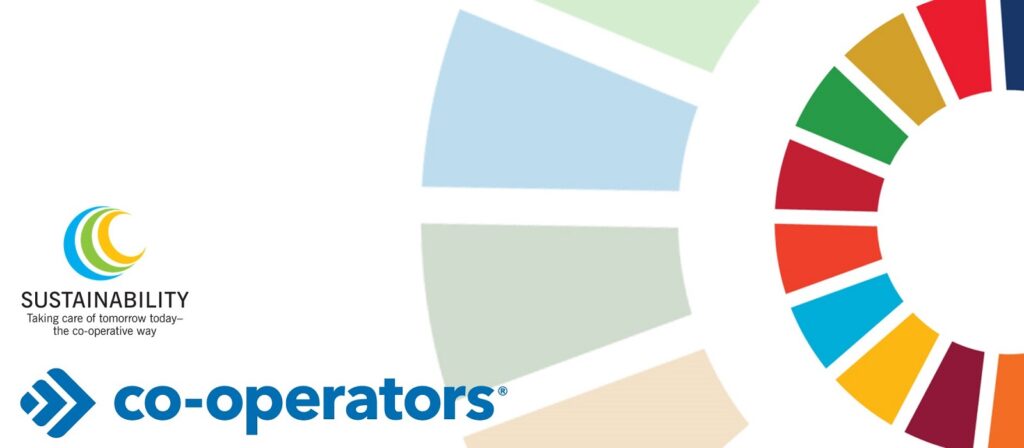The COVID-19 pandemic had (and continues to have) significant and varied impacts on The Co-operators, as well as on the members, clients and communities it serves throughout Canada. Its cooperative values were at the heart of how the organisation responded and adapted to the pandemic in 2020: providing financial relief to help member/clients in challenging times and supporting local communities to build collective resilience; whilst also protecting the health and wellbeing of its employees and taking measures to ensure its own continued financial strength. As The Co-operators learns from challenges from the past year, it also identifies long-term opportunities, reimagining the future of work for the organisation and identifying how best to foster productivity, collaboration and positive work-life balance in the “new normal”.
Financial relief for Canadians in challenging times
Through the height of the pandemic and beyond, The Co-operators focused on supporting its clients. While situations were unique and dynamic, many clients faced financial and social disruption of their daily lives during the pandemic.
To help clients throughout the COVID-19 crisis, it provided a range of financial support and flexible options available for clients who encountered financial difficulty, including:
The Co-operators Reduced Driving Refund
COVID-19 changed Canadians’ commuting experience, and fewer cars on the road in April and May meant fewer collisions. As people drove less and driving behaviours changed, trends in auto claims demonstrated a decrease year over year.
In 2020, the organisation set aside more than CAD 35.0 million in direct relief measures through its Reduced Driving Refund, which provided a 15% refund on eligible auto premiums paid in April and May 2020.
As at year-end 2020, CAD 20.3 million in direct relief was returned to eligible policyholders who registered for the refund. The remaining unclaimed Reduced Driving Refunds were reinvested into communities across Canada (see below), prioritising the support of vulnerable and marginalised Canadians experiencing increased financial and social challenges in these uncertain times.
Flexible payment options to ease financial pressures
Clients experiencing financial difficulties were encouraged to consult with their Financial Advisors, who offered a range of options, including payment deferral and extended payment grace periods during the crisis, and forgiveness of insufficient fund fees.
Premium relief across multiple business lines
Because driving habits changed, clients could temporarily change their commuting status and remove vehicles from the road to reduce their premiums. The Co-operators also made changes to ease the burden of seasonal property owners facing travel or social distancing restrictions, including removing some of the conditions around coverage for unoccupied properties.

Improving community resilience through cooperative support
From food production, to retail services, affordable housing, financial services and more, cooperatives enrich Canadian communities with services and solutions that build collective resilience. The Co-operators helped cooperatives across the country pivot in response to a rapidly changing economy, so they could continue meeting the needs of their communities.
CAD 1 million in capital to drive cooperative innovation
Through Co-operators Community Funds, The Co-operators reinforced ongoing cooperative sector support by making $1 million in capital available through the launch of its Co-op Impact Program. The program supports small- and medium-sized cooperatives adapting to a shifting economic landscape in the wake of the pandemic. Through the Co-op Impact Program, low interest loans between CAD 40,000 to CAD 100,000 are available to individual cooperatives whose new or existing project-based initiatives are supporting their efforts to thrive in the COVID-19 environment.
COVID-19 relief funding for Canadian cooperatives
In support of Canada’s cooperative sector, The Co-operators announced a $220,000 COVID-19 Co-operative Assistance Fund to provide provincial cooperative associations with access to financial support (to a maximum of CAD 20,000). This funding support went towards education, safety, advocacy and guidance to enable the pivot of services for their membership and strengthen their financial stability in the wake of the pandemic.
Investing financial strength into communities for pandemic relief and recovery
In 2020, The Co-operators provided funding for Canadian youth and marginalised communities, as many struggled with mental health issues and financial insecurity related to COVID-19. In addition to its ongoing annual support through a variety of partnerships to improve community well-being, the organisation contributed CAD 17.4 million in COVID-19-related relief.
United Way Centraide – CAD 7.7 million donated
To help ensure that Canadians who are most vulnerable and impacted by COVID-19 had adequate support, The Co-operators contributed CAD 7.7 million to local United Way Centraides across the country.
Co-operators Community Funds – CAD 7.5 million for COVID-19 recovery
To further support the long-term pandemic recovery and community resilience, the organisation contributed CAD 7.5 million to the Co-operators Community Funds, a charitable foundation with a mission to support initiatives that lead to job creation and/or enhanced employability for marginalised youth and individuals with mental health challenges.
For both the United Way and Co-operators Community Funds, CAD 7.5 million in funding was derived from unclaimed Reduced Driving Refunds in 2020.
Co-operators Community Funds – CAD 2 million Pathways to Employability Initiative
CAD 2 million was dedicated to launching the Pathways to Employability Initiative to support marginalised Canadian youth who have lost jobs or educational opportunities due to COVID-19 shutdowns.
Kids Help Phone (CAD 150,000 in additional funding)
The Co-operators is a founding partner of the Crisis Text Line powered by Kids Help Phone, which provides youth with a confidential, 24/7 texting service. In 2020, it provided CAD 150,000, to support hiring more counsellors and volunteer crisis responders to handle the increased demand for texting support due to COVID-19. Kids Help Phone is Canada’s only 24/7 national service offering professional counselling, information, referrals, and volunteer led, text-based support for young people.
Boys & Girls Clubs of Canada
CAD 50,000 in relief funding was redirected to help Boys and Girls Clubs of Canada (BGCC) provide emergency support for its members, families and affected communities through no-contact food drops, drive-through food banks, crisis hotlines, meals and accommodations. Since 1900, BGCC has opened their doors to children, youth and families, providing vital programs and services to over 200,000 young people in 700 communities across Canada. This funding was committed for 2020 in advance of the pandemic.
Enactus Canada (CAD 20,000 in additional funding)
The Co-operators partnership with Enactus Canada focuses on enhancing the mental health of post-secondary students, while providing the opportunity for them to do the same in their communities. The Co-operators provided CAD 20,000 in funding to launch a summer Grant Program to address mental health resiliency.
Maintaining its capital strength
In the spring of 2020, The Co-operators acted quickly in areas of governance, risk, operations and investing, and took management action to ensure its capital position was maintained in times of uncertainty.
- Management oversight - The Capital Oversight Committee was created, one of four new management oversight committees created as an initial response to the crisis, whose mandate was to ensure that The Co-operators capital remained strong, above both regulatory and internal minimums.
- Risk management - Robust annual stress testing process was further enhanced in response to increased uncertainties as a result of the pandemic. Multiple stress scenarios were analysed in 2020 to anticipate capital resiliency, considering varying levels of economic and market recovery, government and regulatory interventions, and length and severity of the pandemic.
- Scenario analysis - As part of its financial planning process, the organisation enhanced its scenario planning analysis to ensure that its forward-looking financial plans for growth and stability were flexible, robust and appropriate, given the increased uncertainty around economic recovery.
- Fixed income investments - Further analysis was performed on the fixed income investment portfolio to model the impact of recessionary scenarios to ensure it remains resilient to market shocks.
- Debt issuance - CAD 300 million issued in debt to strengthen its capital position, which provided a buffer to capital and liquidity, and allowed the organisation to redeploy capital as needed across the organisation.
- Invested asset portfolio - performed a strategic recalibration of the P&C invested asset portfolio to reduce exposure to common shares, further improving the resilience of its capital position and ensuring it maintained strong liquidity throughout the year.
Protecting the health and well-being of its people
In the days before widespread lockdowns were announced in Canada, The Co-operators immediately moved its people to work-from-home environments, including employees, Financial Advisors, agency staff and call centre staff, to proactively ensure the health and safety of its people and local communities. This included close to 8,000 individuals – an unprecedented move in the organisation’s history.
Providing resources to navigate difficult times
Ongoing tips and resources were developed to support the mental and physical health of employees and help them stay connected as everyone worked through this time of change together. These resources covered topics such as mental health, managing work at home, balancing work with educating children at home, and physical and financial health.
Making job security a priority throughout the pandemic
During the height of the crisis, the organisation worked through its business continuity plans with a core staff and scaled its technological capacity to ensure all employees could work securely and seamlessly. At the same time, it continued to pay full wages to all employees, whether they were working during this period or not.
Increasing employee spending accounts for wellness and home offices
To support the health and well-being of its employees working from home, and in response to the need for technology and office equipment, the company enhanced its Personal Spending Account (PSA) for wellness expenses coverage by an additional CAD 250 per employee, to a total of CAD 500, to purchase home office equipment.
Designing flexible work arrangements
Recognising the diversity of life situations, it worked with employees to identify flexible work arrangements that would support work-life balance and mental health, and address the unique circumstances caused by the pandemic. This ultimately led to better productivity and resilience among its employees, which meant it could ensure the needs of the business and clients.
The future of work
Today’s workplace looks significantly different than it did one year ago. The COVID-19 pandemic led to an unprecedented shift away from in-person engagement. An expansion of online, remote and flexible work arrangements redefined boundaries between homes and workplaces.
To ensure The Co-operators kept employees and communities healthy and safe, the vast majority of its employees worked from home throughout the year, with over 90% of corporate employees still working at home at year end. A small subset of employees who were required to be in the office due to the nature of their roles were provided a safe and isolated work environment by maintaining virtual work for the majority of employees. As regional public health restrictions eased, offices were prepared to welcome employees, up to 25% capacity, to a safe, socially distanced work environment.
With the rise of virtual work, The Co-operators continues to explore how it can embed and embody a strong workplace culture in its day-to-day activities and interactions. As the organisation learns from challenges and identifies opportunities presented by the new working reality, it is reimagining the future of work at The Co-operators.
While 2020 was broadly defined by its challenges, great benefits emerged in terms of the ability to work with greater flexibility and enhance the culture of performance, innovation, diversity and inclusion. These opportunities enabled the organisation to continue with a growth mindset and build a better workplace.
Expanding online, remote work for the long term
As conditions allow, more employees, Financial Advisors and client-facing staff will return to the office. At the same time, increased comfort and capability to work remotely will lead to an increase in remote work going forward. Remote work not only reduces the impact of physical operations in terms of energy, emissions and travel expenses; it affords greater flexibility for employees and opens us up to a wider, more diverse pool of talent who may not live in close proximity to The Co-operators’ corporate locations.
Accelerating business transformation and performance culture
The pandemic has also introduced an increased urgency for businesses to evolve. Competitors and consumer expectations will continue to evolve at a pace well beyond what was experienced prior to the pandemic. The organisation must be positioned to evolve at pace. The goals in The Co-operators’ strategic plan to transform the organisation digitally require it to ensure that its workforce is poised to embrace the speed of change required to meet this challenge.
Flexibility and adaptability as a core strength
In the early days of the COVID-19 pandemic, the need to adapt and stay flexible in response to the rapid pace of change became a valued competency. Understanding that a one-size-fits-all approach does not do well to serve the needs of the business nor the health and well-being of the worker, the organisation is committed to moving forward with a culture of flexibility – ensuring employees remain strong and ready to respond as challenges arise.
Achieving high performance through positive mental health
With the current pace of change, the organisation will increasingly need its people to operate with a bias towards action. Especially in challenging times, to ensure the needs of clients and communities are met, it must work at pace and be ready for change and stay focused on outcomes. To be successful, it must promote positive mental health and set up conditions that put the well-being of its people first. This will ensure employees have the emotional and practical tools they need to perform.





